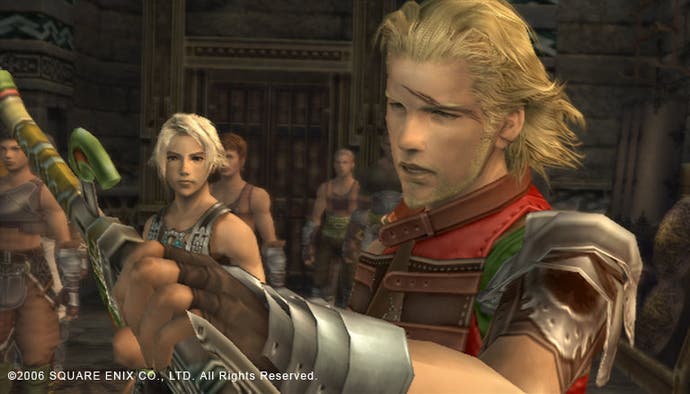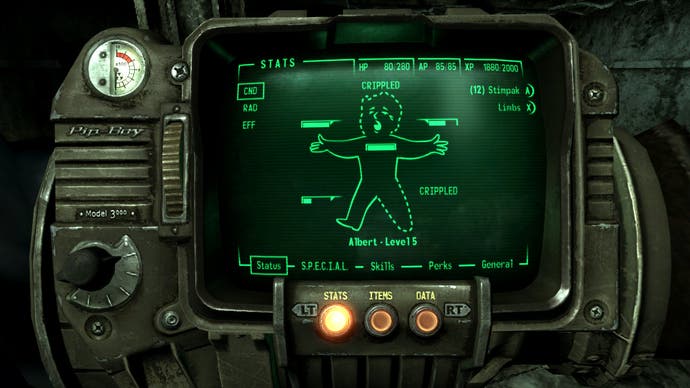What the FAQ?
From the archive: John Teti explores the world of game guides.
Every Sunday we like to plunder our archives to bring you an article you may have missed, or maybe would like to read again. This week, we bring you John Teti's examination of the FAQ kings, originally published in September 2010.
Damir Kolar wrote 800 pages, give or take, on the topic of Final Fantasy XII. I find that moving. The guy sits down at his keyboard and pours out his passion for console RPGs in miles of text. How can you not love him for that?
"Yes, bully for him," you say. "Who would want to read it, though?" Well, this will sound crazy, but: millions of people.
That's because Kolar isn't some half-cocked savant cranking out a magnum opus of neo-gothic RPG fan fiction. He writes FAQs - those painstakingly crafted game guides that rescue your sorry ass when you're up against a brutal boss fight and you just can't figure out how to win and this game is so unfair and seriously you are about to LOSE IT.
"FAQ" used to mean "frequently asked questions" but in online gaming communities like GameFAQs.com it has come to mean walkthroughs, guides, item lists - anything that keeps you from hurling your controller at the wall in disgust. FAQ means salvation. And a mostly anonymous guild of dedicated authors specialise in providing it.
They don't ask for anything in return. That must piss off the people who print the glossy strategy guides your local game store props up by the register. The publisher types are just trying to turn an honest profit. Meanwhile, the FAQ authors are writing more detailed, more flavourful guides, and giving them away for free.
My question is: why? Don't get me wrong, I think it's normal and commendable for people to be generous with their time. I like to think that we all have that charitable side to us.
But then again, 800 pages. I haven't even written 800 words here, and already I've taken two naps and what I like to call a "sleep break." There's something extraordinary about the selfless dedication you find in the game-guide ecosystem. So I chatted up a few of the FAQ world's luminaries to see what drives them.
"I've done everything the game has to offer."
You may know Damir Kolar from the first three paragraphs of this article. Unless you're reading this like a FAQ, skimming only the bits you want and ignoring the rest. That's how most people use the things, after all. You wouldn't dip into Chapter 7 of The Brothers Karamazov and declare yourself good to go, but hey, nobody said FAQs were great literature, either.
The 32-year-old Kolar posts to GameFAQs under the name Split Infinity. He specialises in sprawling Japanese RPGs. He documents their animals, vegetables, and minerals with the enthusiasm of a 19th-century naturalist in the sub-Saharan jungle. If you need to know how a Kfuga Lily responds to Beam attacks in Xenosaga Episode II, Split has you covered.
I first encountered Kolar's FAQs during my second playthrough of Final Fantasy XII. His mammoth guide to that game became an unofficial bible (a bible that, in an appropriate parallel to my lapsed Catholicism, I read in scattered fragments).
You can tell a few things about Kolar from the FAQs. He's thorough. He's resourceful. He has an unabashed fondness for female RPG characters. But you might not guess that he has such strong ideas about what a FAQ should and shouldn't be. That insight, my friends, required the power of my hard-hitting interview style.
There were a couple of reasons why I wanted to write guides. The first was to help the community that had helped me. I also felt that the quality and accuracy of some of the work was really shabby - even below what I would expect from a free guide.
I decided that I would make guides with as much information as possible. The thing I dislike reading the most in guides are narrations of the game's story, or darn spoilers. I don't open up a guide to read up on events - there are scripts for that.
I detest story narration in a FAQ. In my opinion, the purpose of a FAQ is to guide a player through the game from beginning to end. What should be included of the story is, maybe, characters' bios and the prologue - what you learn in the first five minutes of the game.
Including the game's detailed mechanics is often [enough of] a problem [anyway], because no readily available source exists in English that would serve as a basis for the writer's work.

That's where Japanese guides come in. I think I have Japanese guidebooks for about half of the games I made guides on. I get information on the games' mechanics from those. I can't speak or read Japanese, but I was able to figure it out from context.
Positive feedback far outweighs the negative - negative in the sense that sometimes, when new players ask for recommendations of a guide, [GameFAQs] board regulars advise against using mine because of the sheer volume of information.
RPGs usually take a long time to finish, and they may contain many secrets, some of which can be a pain to find (like the Zodiac Spear in Final Fantasy XII). I'm an OCD gamer. I want to provide a guide that will hopefully include everything that a gamer needs to consider his or her file 100 percent complete, in the sense of the gamer saying, "Now I've done everything the game has to offer."
Don't write a guide for a game that already has a plethora of guides. Try to come up with an aspect that nobody has covered yet.
Unless you're a professional FAQ writer, don't write guides just for money. It ruins our reputation and makes your work shoddy. GameFAQs has "FAQ Bounties" [offering rewards for FAQs on new games] and sometimes a shoddy guide makes it first, claiming the prize. Though money is nice, your initiative for starting the guide in the first place was to help others.
"Are you condescending to me?"
Maybe one of the reasons that FAQ writers don't get more cred is there's a certain shame in consuming their work. FAQs are awesome documents, but there's also something pornographic about the way they lay everything bare. In fact, sometimes I feel more shame looking at a FAQ than I would hypothetically viewing pornography in theory.
A friend recently admitted that he'd consulted a FAQ to get past the last few puzzles in Limbo. I struggled for a response, mustering only this: "Well, you're tired. Sometimes you just feel like finishing." (The innuendo was unintentional but, in retrospect, inevitable.)
My friend sensed my hesitation. "Are... Are you condescending to me, Teti?"
Yes, I was.
"No," I said. The stench of his lost honour fouled the room, but we both had to deny we smelled it. We changed the subject.
I don't really care whether my buddy consulted a FAQ or not - I believe in letting people enjoy games however they want. But I think most of us have an internal ruleset for when it's "OK" to start Googling for a solution, and the zeroth rule is this: Thou Shalt Not Offend Thine Own Sense Of Gamer Pride.
It's foolish pride, but that makes it no less precious. I like to think that, given enough time, I could achieve anything that a game might ask of me. When I consult a FAQ, I tell myself that it's because I'm short on time, but part of me suspects that I'm actually a dumb jerkbutt who stinks at videogames and has to go crying to his mommy The Internet for help. FAQ means mortality.
I broached the subject of gamer pride with Ryne Gardner, who goes by Axel7174 on GameFAQs. He's contributed 20 FAQs to the site, mostly blockbuster fare like Assassin's Creed II and Grand Theft Auto IV, and he writes with a breezy, personable style, referring to himself as "your host." A junior at SUNY Stony Brook in New York, he's majoring in English but contemplating a switch to something else - in other words, a true English major.
Nobody wants to admit that they couldn't accomplish something and had to seek outside help, but the fact is, going by the hits I get, a lot of people will check in and get a tip or a maybe a whole strategy, or even more.

Hmm. I'll check for you right now... For GTA4, 962,674 [hits] all-time.
I start by maintaining the modesty I usually claim in most of my guides, stating that I'm far from perfect.
One aspect [of my style is] a strong attention to detail. But I like to create an easy-going air in the guides, injecting jokes - occasionally weak - here and there, and trying to make it a fun experience. I don't want to project myself terribly much through the document, but at the same time, I don't want to be just a "voice".
Add your own personal influence, whether it's in the way you format your paragraphs, the humour, the ASCII art, anything. But I suppose the most important thing to say is that standing out won't be as important as trying to convey [the facts] clearly, and trying to add as much detail as you can. That in itself adds a little uniqueness.
Exactly. Not everyone notices the same things. It's an interactive experience. I feel like 80 per cent or so is my own work, and the rest is feedback from readers. It's not just a cold, lifeless document. It should have some personality to it.
"It's still not perfect."
A lot of recent games have this pathetic desperation for you to "share" them. Skate 3 wants me to upload videos of my pretend self skateboarding in its pretend city. Blur invites me to Tweet my latest race victory - say, what's that sound? Oh, it's hundreds of "unfollow" buttons being clicked at once.
Skate and Blur are both fine titles, but begging to be one of the popular kids works no better for video games than it did for me when I was in junior high. Ahem.
One of the more effective (albeit work-intensive) ways that developers entice players to share is by crafting a world that defies solo exploration. When that happens, the FAQ creators go to work and, as Gardner pointed out, an organic collaboration ensues. Put a vast frontier out there and people will work together to understand it. FAQ means community.
In some cases, the mass collaboration gets so big that a single-author FAQ just won't cut it anymore. That's the case with The Vault - the Fallout wiki - which is one of the most impressive fan-created resources on the web. It catalogs every cranny of the Fallout mythology, but it's not an info dump like a lot of wikis. It feels curated because founder Pawel Dembowski, a 27-year-old student from Poland, has set the tone since he founded The Vault in 2005.
It was originally part of Duck and Cover, a Fallout fan site. I had help from some other users, but it was mostly me doing the edits back then.
It was a wiki from the beginning, although it goes back to the Fallout Bible, which was a guide to the Fallout lore by Chris Avellone, one of the Fallout 2, and now Fallout: New Vegas, designers.
The Fallout Bible was never finished because Avellone left Interplay. So the wiki's purpose was, to an extent, to continue the work. [And] also to document all Fallout lore in the hope that it would be helpful to Bethesda when creating Fallout 3.

I know it was.
Yes, and it's actually evident from some in-game content. One funny example is one of the terminals in the Citadel in Fallout 3, detailing the history of the Maxson family, the leaders of the Brotherhood of Steel. There are entries for Roger Maxson, the founder of BOS, his son Maxson II and his grandson John Maxson.
The thing is, Maxson II was what I called the guy in The Vault because there was no canonical first name given for him anywhere in the games. Instead of giving him an actual name, the devs simply copied the name of the article - "Maxson II" - assuming that it's canon.
For most of its life it was only me, or me and a couple of other editors who mostly got bored after a while and left. It didn't really take off as a community until just before the premiere of Fallout 3.
Just look at this chart and guess what point is the premiere of Fallout 3.
Yeah, there are. Sometimes there are disputes even among developers. Two of the original developers of Fallout, Chris Taylor and Tim Cain, have entirely different theories on how ghouls are created in the Fallout universe, for example.
I don't have as much time for it as I used to, but it has developed such an active community that I don't need to oversee it myself as much. It's still not perfect. There's always a lot of stuff to fix or expand upon.
The best of fandom
To sit down and assemble a 4-megabyte raw-text walkthrough, you pretty much have to be a nerd - otherwise the word has no meaning. But I use "nerd" as a compliment here, even if it's easy to interpret it otherwise. After all, in the kingdom of game nerdery, you have many lesser species - the fanboy, the troll, the agoraphobe, the addict, and so on - who get more than their share of the attention.
If anyone ought to carry the nerd standard, though, it should probably be the FAQ writers. They represent the best of us, making the medium less intimidating to connoisseurs and novices alike.
That's what charms me most about the whole FAQ enterprise: It opens up the discussion. I like that gaming can be difficult, but it doesn't need to be exclusive. Some of us need a little help and the FAQ writers don't judge. They just hope to have the answers.

